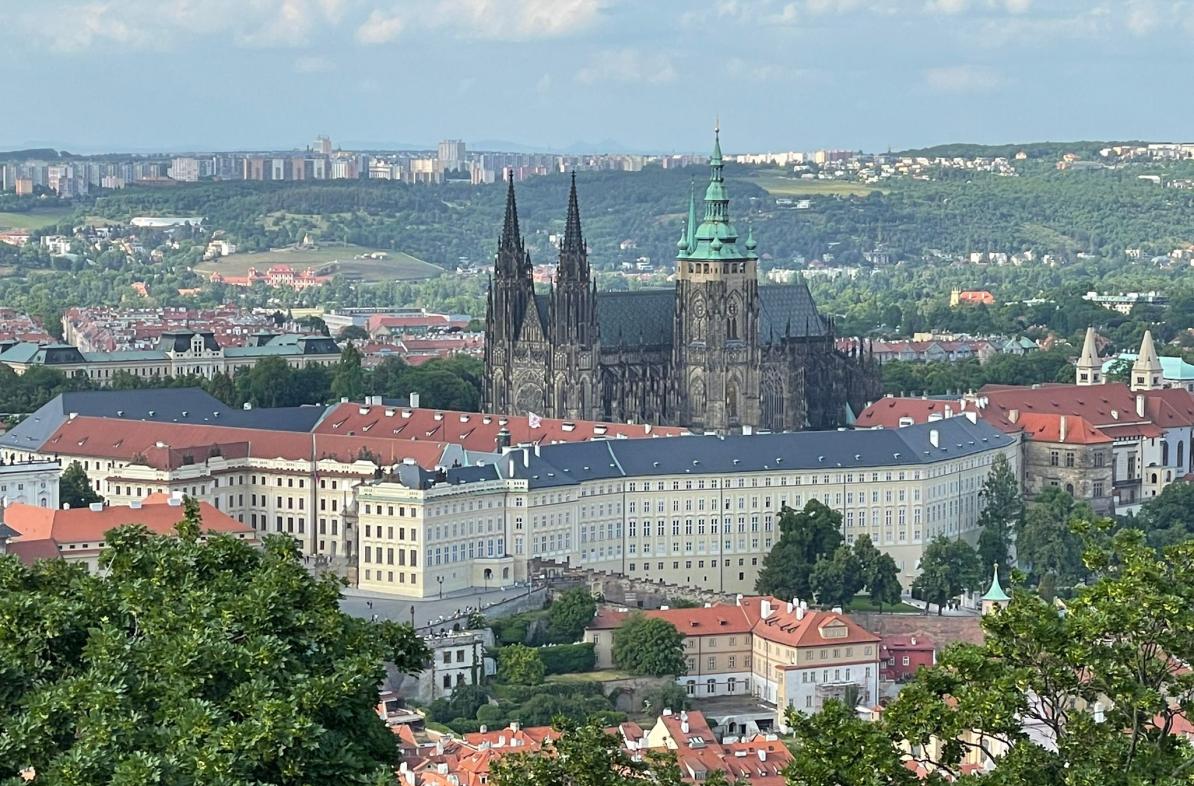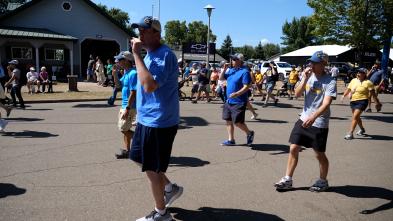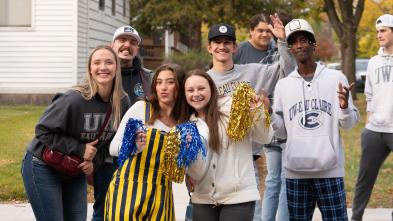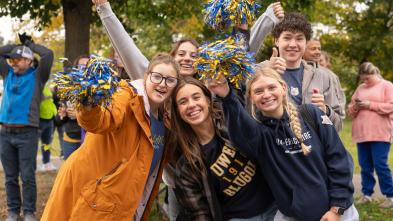
Summer immersion in Central Europe builds knowledge and understanding of history and cultures
A UW-Eau Claire program looked different this year but still gave Blugolds opportunities to be immersed in European history and culture this summer. Three students and two faculty leaders spent three weeks in Germany, Czech Republic, Austria and Slovakia.
Three UW-Eau Claire students and two faculty leaders spent three weeks in Germany, Czech Republic, Austria and Slovakia in July and August as part of the university’s Central European Travel Seminar (CETS).
Despite COVID-19 complications and delays, senior Bekah Henn says the immersion experiences were every bit as life-changing as she hoped they would be.
“I was able to learn more about the history and culture of Germany, Czech Republic and Austria,” says Henn, a nursing major from Plum City. “This gave me a much better understanding of the history of Europe and of the United States and how they connect.
“The countries we went to were also very environmentally friendly, which made me think of some small changes I could make each day to help the environment. I was also able to interact with many different types of people, which will help improve my interpersonal skills as I pursue a career in nursing.”
Modified faculty-led immersion
The focus of CETS varies each year, though usually three faculty from three disciplines lead the program, which often includes more than 20 students. In a typical year, students complete a three-credit CETS course during the spring semester, which prepares them for the monthlong summer immersion in Central Europe.
During the immersion, students learn about the complications facing Central Europe, a region caught between empires, world wars and the Cold War. During the summer immersion, they analyze the region through multiple disciplines and perspectives, says Dr. Jeff DeGrave, UW-Eau Claire’s intercultural immersions coordinator.
In 2020, 18 students completed their coursework during the spring semester, but the summer travel part of their program was canceled because of COVID-19.
A year later, as COVID-19 numbers were decreasing and restrictions were easing, UW-Eau Claire offered those students the opportunity to complete their CETS program by participating in a modified version of the summer immersion.
So, in July and August, DeGrave, Dr. Chia-Yu Hsu, an associate professor of music composition, and three students spent three weeks in Germany, Czech Republic, Austria and Slovakia.
The focus of this year’s modified immersion was on music, history and geography.
Being mindful of the pandemic, the faculty leaders shortened the immersion to three weeks, eliminated visits to countries with high COVID numbers, extended their stay in Prague and added stops in two cities, Dresden and Brno.
“Nothing can replace the experience traveling with peers and gaining skills together,” Hsu says of why it was important to offer students the opportunity to complete the immersion portion of the program. “Students expressed their appreciation for these in-person experiences.”
Henn, who has had little opportunity to travel, was thrilled to be part of this year’s immersion. Sharing the experiences with others was especially meaningful after more than a year of physically distancing and learning virtually, she says.
“It was amazing to get to go to all these places in person and have face-to-face conversations with so many different people,” Henn says. “It was also really nice to spend time with the other students and faculty. We had many meals together, which led to many meaningful conversations and discussions.”

Valuable learning experiences
Beyond learning the history of the region, traveling to Central Europe also helps the Blugolds learn to navigate foreign cultures, piques their interest in exploring new places, helps them gain confidence in their ability to interact with people from different backgrounds and sometimes even helps them discover potential new career paths, DeGrave and Hsu say.
“We hope that students learn to adapt to and appreciate other cultures, gain skills to navigate in new cities and build confidence traveling independently,” Hsu says.
“Also, students learn about power, privilege, racism, fascism, communism, discrimination and what it’s like being someone who doesn’t speak the local language, like many immigrants who come to the United States,” DeGrave says. “Students learn how to navigate public transportation systems such as metros, trams and buses — systems that are only present in major cities in the U.S. and not nearly to the degree that they are found in Europe.”
While she’d never traveled outside the U.S. before the immersion, Henn says she always has been interested in exploring new places and learning more about other cultures.
“So, I was very excited about CETS because it gave me the opportunity to travel to multiple countries,” Henn says. “I hoped to explore the culture of other countries and learn about current life as well as the history within these countries.”
Among the highlights of the summer immersion was a visit to YAAM, the Young African Artists Market, a cultural outpost of African culture in the heart of Berlin, which DeGrave says “is always a unique experience.” The Blugolds also enjoyed attending a classical music concert in Prague.
DeGrave says other experiences included visiting the Berlin Wall; the Jewish Cemetery in Prague, where the Jewish gravestones are broken, piled on top of one another and scattered; the Kafka Museum; and the public Central Cemetery in Vienna where famous composers like Beethoven and Brahms are buried not far from the unkempt Jewish section of the cemetery, where the city has neglected care of the Jewish plots for decades.
“We also met with a woman who grew up in Prague and listened to her accounts of the fall of communism,” DeGrave says. “Similarly, a musician who was raised in East Berlin, talked about how his life was actually pretty good — despite being raised in a communist world.”
The stories the locals shared were fascinating, Henn says.
“In Prague, we met a local named Lucy, who had lived in the Czech Republic her whole life, including when it was under communist control by the Soviets,” Henn says. “However, unlike many people living during that time, Lucy had a really good life and a fair amount of freedom. Her work was related to international trade, and she was treated very well by the Soviets. Lucy’s story was much different than others we had heard throughout the course, and it provided us with a different perspective of life during communism in the Czech Republic.”
Hsu says she also enjoyed biking along the Danube, meeting and talking to local guest speakers, attending concerts in beautiful venues and visiting museums, the Hohenschoenhausen (Stasi Prison) and cemeteries.
Sachsenhausen concentration camp
Hsu, Henn and DeGrave all say that spending time at the Sachsenhausen concentration camp just outside of Berlin was an especially powerful experience.
“It was certainly a sobering moment, but one that is quite necessary,” DeGrave says, noting that typically CETS takes students to Auschwitz concentration camp in Poland. “We canceled the Poland segment, so we wanted to make sure students saw firsthand the racism, suffering and death that the Nazis perpetrated.”
Seeing a concentration camp in person was an eye-opening experience, Henn says.
“It was a very strange feeling to be actually standing in the camp,” Henn says. “I couldn’t believe how large it was, it seemed to go on forever. Even standing within the camp it was hard to imagine all the violence and torture that took place there. It was also a very somber feeling to be able to walk out of the camp because it made me think of the thousands of people who never got the chance to walk back out.”
The group also went to “Track 17,” the train platform outside of Berlin where Jews were sent to board trains to various concentration camps in Central and Eastern Europe.
Traveling during a pandemic
What is it like to lead students on an international immersion program during a worldwide pandemic?
“It’s complicated,” DeGrave says. “With the constantly changing policies and protocols based on constantly changing COVID numbers, keeping track of all of the rules and policies in multiple countries — there is no single set of rules for all countries in the European Union — was and remains a constant challenge.”
That said, the students gained some valuable skills from traveling during these unprecedented times, DeGrave says. They had to learn to quickly adapt to new and changing COVID protocols depending on location, and they got to see how people in other parts of the world are reacting to COVID-related protocols.
“Learning to be very, very, very flexible and patient because one would never know if a particular business might be closed due to COVID, if delays would take place due to COVID, if a musical performance would be canceled due to COVID (which is what happened to us), if we would be allowed to enter a particular place due to COVID, figuring out how to download apps to complete forms in languages other than English that were required to enter a particular venue due to COVID, wearing a mask at all indoor events,” DeGrave says of the many challenges they had to overcome.
“Our mantra during CETS was ‘We’ll see what happens’ as we never really knew for sure how our plans would go from day to day due to changes brought on by COVID.”
Fortunately, DeGrave says, most places opened about two weeks before they arrived, so they were able to do a majority of what they had planned, though each experience was slightly altered due to COVID precautions.
“But we learned to be flexible and patient, which are key skills needed in any immersion program during COVID or otherwise,” DeGrave says, adding that they also had to trust non-U.S. medical systems since they were required to take a COVID test in Europe prior to returning to the U.S.
The faculty leaders adapted the program because of COVID-19, shortening it by a week and adjusting travel locations based on safety.
Normally the program includes Germany, Czech Republic, Austria, Slovakia, Hungary and Poland. They removed Hungary and Poland because, at the time they needed to make the decision, the countries had very high COVID numbers. Typically, the students and faculty would travel in May and June, but the faculty pushed the dates back this year hoping that it would be safer. They also traveled for three weeks instead of the usual four weeks.
The countries they chose to visit all required international travelers to be fully vaccinated.
“We couldn’t get a table at a restaurant without showing our vaccination cards, we had to get a COVID test within 72 hours of returning to the U.S., we had to wear masks at all times on public transportation, in museums, etc., the list goes on,” DeGrave says of safety protocols. “Central Europe was one of the few places on the COVID map where most countries were Level 1 or Level 2 and are open to travelers. We took all the proper precautions to allow this program to happen and the countries we visited did the same.”
While only three students were able to travel this year, the smaller number created new opportunities to do things they couldn’t do with a large group of students, DeGrave says.
“Even though these students did not go to Hungary or Poland, we were able to do a lot more within the countries we visited because our small group was significantly more nimble compared to the usual group of 21 students and three professors,” DeGrave says.
DeGrave says he’s thankful that UW-Eau Claire administrators let them adjust the program as needed to make the immersion possible this year.
You may also like


